
Victor August Herbert was an American composer, cellist and conductor of English and Irish ancestry and German training. Although Herbert enjoyed important careers as a cello soloist and conductor, he is best known for composing many successful operettas that premiered on Broadway from the 1890s to World War I. He was also prominent among the Tin Pan Alley composers and was later a founder of the American Society of Composers, Authors, and Publishers (ASCAP). A prolific composer, Herbert produced two operas, a cantata, 43 operettas, incidental music to 10 plays, 31 compositions for orchestra, nine band compositions, nine cello compositions, five violin compositions with piano or orchestra, 22 piano compositions and numerous songs, choral compositions and orchestrations of works by other composers, among other music.
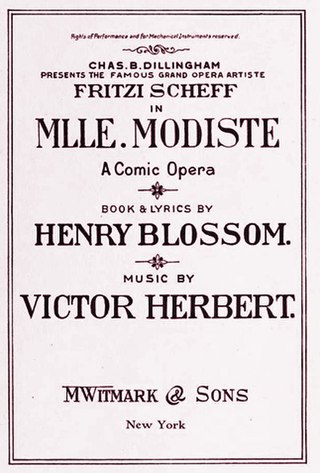
Mlle. Modiste is an operetta in two acts composed by Victor Herbert with a libretto by Henry Blossom. It concerns hat shop girl Fifi, who longs to be an opera singer, but who is such a good hat seller that her employer, Mme. Cecil, discourages her in her ambitions and exploits her commercial talents. Also, Fifi loves Etienne de Bouvray, who returns her love, but his uncle, Count Henri, opposes their union. The operetta features the song "Kiss Me Again".

The Life of the Party is a 1930 American pre-Code musical comedy filmed entirely in Technicolor. The musical numbers of this film were cut out before general release in the United States because the public had grown tired of musicals by late 1930. Only one song was left in the picture. The complete film was released intact in countries outside the United States where a backlash against musicals never occurred.
Henry Martyn Blossom Jr. was an American writer, playwright, novelist, opera librettist, and lyricist. He first gained wide attention for his second novel, Checkers: A Hard Luck Story (1896), which was successfully adapted by Blossom into a 1903 Broadway play, Checkers. It was Blossom's first stage work and his first critical success in the theatre. The play in turn was adapted by others creatives into two silent films, one in 1913 and the other in 1919, and the play was the basis for the 1920 Broadway musical Honey Girl. Checkers was soon followed by Blossom's first critical success as a lyricist, the comic opera The Yankee Consul (1903), on which he collaborated with fellow Saint Louis resident and composer Alfred G. Robyn. This work was also adapted into a silent film in 1921. He later collaborated with Robyn again; writing the book and lyrics for their 1912 musical All for the Ladies.

Song of the Flame is a 1930 American pre-Code musical film photographed entirely in Technicolor. Based on the 1925 operetta of the same name, the film features a screenplay by Gordon Rigby adapted from the musical book written by Oscar Hammerstein II and Otto A. Harbach for the operetta. The movie also features many of the songs from the operetta which used lyrics by Hammerstein and Orbach and music by George Gershwin and Herbert Stothart. The film was produced and distributed by First National Pictures. It was the first color film to feature a widescreen sequence, using a process called Vitascope, the trademark name for Warner Bros.' widescreen process. The film, based on the 1925 Broadway musical of the same name, was nominated for an Academy Award for Sound Recording. It is part of the tradition of operetta films, popular at the time.
Kiss Me Again may refer to:
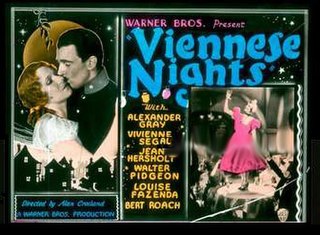
Viennese Nights is a 1930 American all-talking pre-Code musical operetta film directed by Alan Crosland and starring Alexander Gray, Vivienne Segal, Walter Pidgeon, Jean Hersholt, Bela Lugosi and Louise Fazenda. It was photographed entirely in Technicolor and released by Warner Brothers. Viennese Nights was the first original operetta written especially for the screen by Oscar Hammerstein II and Sigmund Romberg. It was filmed in March and April 1930, before anyone realized the extent of the economic hardships that would arrive with the Great Depression, which had begun in the autumn of the previous year. Although not a box office hit in the United States, the film had long box office runs in Britain and Australia. It is one of the earliest sound films to have a short pre-credit sequence.
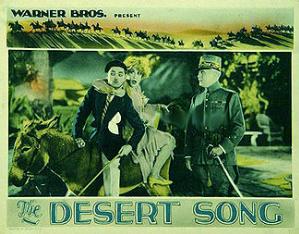
The Desert Song is a 1929 American pre-Code operetta film directed by Roy Del Ruth and starring John Boles, Carlotta King, Louise Fazenda, and Myrna Loy. It was photographed partly in two-color Technicolor, the first film released by Warner Bros. to include footage in color. The film included a 10-minute intermission during which music was played.

No, No, Nanette is a 1930 American pre-Code musical comedy film with Technicolor sequences that was directed by Clarence G. Badger and released by First National Pictures. It was adapted from the play of the same title by Otto A. Harbach and Frank Mandel. No, No, Nanette was a popular show on Broadway, running for 321 performances, and was produced and directed by Harry Frazee.
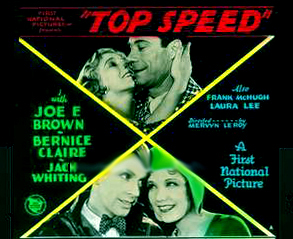
Top Speed is a 1930 American Pre-Code musical comedy film released by First National Pictures, a subsidiary of Warner Brothers. It was based on a 1929 stage musical of the same name by Harry Ruby, Guy Bolton and Bert Kalmar. The film stars Joe E. Brown, Bernice Claire, Jack Whiting, Laura Lee, and Frank McHugh.

Going Wild is a 1930 Warner Brothers pre-Code comedy film based on the 1910 play The Aviator by James Montgomery and directed by William A. Seiter. The film stars many musical stars along with Joe E. Brown, Frank McHugh and Johnny Arthur.

On the Town is a 1949 American Technicolor musical film with music by Leonard Bernstein and Roger Edens and book and lyrics by Betty Comden and Adolph Green. It is an adaptation of the Broadway stage musical of the same name produced in 1944, although many changes in the script and score were made to the original stage version; for instance, most of Bernstein's score was dropped in favor of new songs by Edens, who felt that the majority of Bernstein's music was too complex and too operatic for film audiences. This caused Bernstein to boycott the film.

The Mad Genius (1931) is an American pre-Code drama film produced and distributed by Warner Bros. and directed by Michael Curtiz. The film stars John Barrymore, Marian Marsh, Donald Cook, Charles Butterworth, and in small roles, Boris Karloff and Frankie Darro. The film is based on the play The Idol (1929) by Martin Brown, which opened in Great Neck, Long Island but never opened on Broadway.
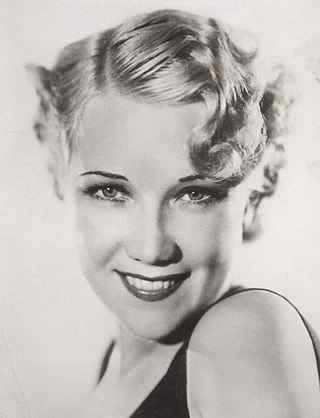
Bernice Claire was an American singer and actress. She appeared in 13 films between 1930 and 1938.
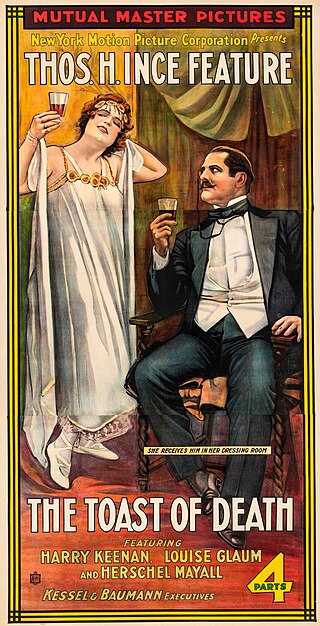
The Toast of Death is a 1915 silent era drama/romance motion picture released by Mutual Film Corporation starring Louise Glaum, Harry Keenan, and Herschel Mayall.
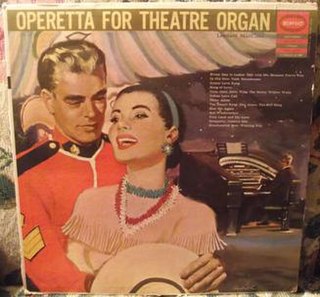
Operetta for Theatre Organ is an album released by Leonard MacClain in 1957 on Epic Records LP record LN 3372. On release, J. Albert Fracht reviewed the album as "full of good playing." The album features music from Victor Herbert's "Red Mill", "The Fortune Teller" and "Mlle Modiste." Also featured are songs from Sigmund Romberg's "The Desert Song" and "The New Moon". Rudolf Friml is represented by songs from "The Firefly", and "Rose Marie".

Mademoiselle Modiste is a 1926 American silent romantic comedy film produced by and starring Corinne Griffith and distributed by First National Pictures. Robert Z. Leonard directed Griffith in a story based on a popular 1905 Victor Herbert operetta on Broadway, Mlle. Modiste, with a libretto by Henry Martyn Blossom, which was similar to the MGM film The Merry Widow. It is now considered a lost film.

Spring Is Here is a 1930 American Pre-Code musical comedy film produced by First National Pictures and distributed by Warner Bros. It was adapted by James A. Starr from the 1929 musical play, of the same name, by Owen Davis, with music by Richard Rodgers and Lorenz Hart. The film stars Lawrence Gray, Alexander Gray, and Bernice Claire.
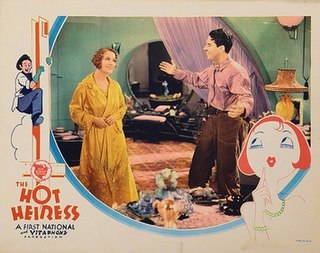
The Hot Heiress is a 1931 American pre-Code comedy film directed by Clarence G. Badger and written by Herbert Fields, with three songs by Richard Rodgers and Lorenz Hart. The film stars Ben Lyon, Ona Munson, Walter Pidgeon, Tom Dugan, Holmes Herbert and Inez Courtney. The film was released by Warner Bros. on March 28, 1931.
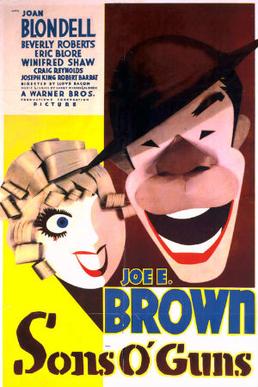
Sons O' Guns is a 1936 American comedy film directed by Lloyd Bacon and written by Jerry Wald and Julius J. Epstein. It stars Joe E. Brown, and features Joan Blondell, with Beverly Roberts, Eric Blore, Craig Reynolds and Wini Shaw. It was released by Warner Bros. on May 30, 1936.


















